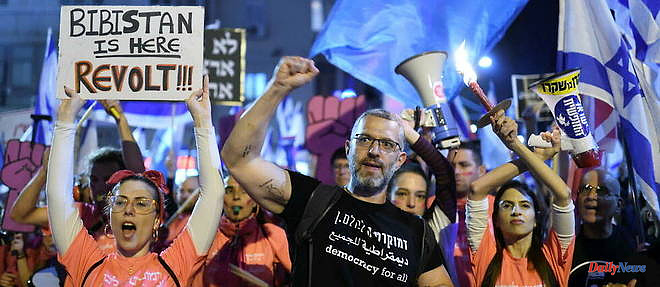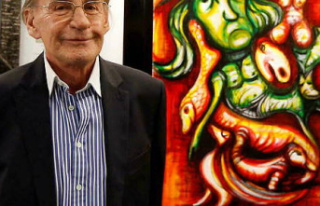Definitely, nothing can stop the movement of opposition to the reform of the judicial system carried out at the pace by the government. It's been nine weeks in a row that Israelis have demonstrated en masse on Saturday nights to say no to the government.
On Saturday March 4, they even set a record: 250,000 in total, including 177,000 in Tel Aviv; 20,000 in Jerusalem; 35,000 in Haifa. But there were also thousands in small towns often considered Likud strongholds. In Beersheba, for example, the Negev metropolis in the south of the country, which in the last elections saw more than 42% of voters vote for Binyamin Netanyahu's party. There were 6,000 people waving Israeli flags and signs against "the coup leading to the dictatorship of Justice Minister Yariv Levin".
In silence, they listened to Benny Gantz, National Unity party chairman and defense minister in the previous government, urge them to keep protesting: "One of the things that protected Israel for 75 years, with the army, it is the independence and the power of the judiciary. Without him, we will no longer be protected… A deepening social divide is endangering this country and Netanyahu lets it go…”
We could also mention the entry into this wave of protests of other strongholds of the nationalist right, Netanya – 10,000 demonstrators – and even Holon or Bat Yam, these small suburban towns south of Tel Aviv. It's unique enough to be reported.
The events of the past week explain this record influx of pro-democracy protesters. Above all, what happened on February 26 in Hawara. At midday, two Israelis from the Har Bracha settlement were murdered in this small town in the northern West Bank. The two brothers passed through this locality. A man on a motorbike stops, shoots them at point-blank range and kills them, before fleeing.
Yehouda Fuchs, the commanding general of the central region, and therefore of the West Bank, did not hesitate to describe the action carried out by these settlers as a "pogrom". Adding to the shock felt by many Israelis - the bombing that killed the two younger brothers and the sacking of Hawara - was the near absence of arrests among the Jewish assailants. Only two of them were placed in administrative detention. Eight others who had been arrested were released without further trial.
Holocaust survivor Monique L., a protester already highly motivated by the fight for pro-democracy, told Le Point that she was upset by Hawara: "It reminded me of what was happening in Eastern Europe when a crowd descended on a village Jew, setting it on fire without the police, when there were any, intervening. »
The police did not hesitate to throw, in the midst of the demonstrators, de-encirclement grenades. Result: injuries, some quite seriously, and arrests with custody and sometimes trial. For Monique L. - and she is not the only one - there are double standards here: "On the one hand, only two Israelis detained for the sacking of Hawara and, on the other, grenades of encirclement on the crowd of pro-democracies in Tel-Aviv. »
This massive mobilization against the government is also spreading among IDF reservists. All arms are affected: infantry, commandos, the prestigious 8200 technology unit and, above all, the Air Force, where 37 elite pilots have announced that they will not be training this week.
One said: “Without a judicial system to protect us, we risk being dragged before the International Court in The Hague. But those around Netanyahu call us anarchists…”
To be operational, these pilots must complete a certain number of flight hours. In this case, they belong to the strategic F15A squadrons which, if necessary, could participate in a strike against Iranian nuclear power. This wave of insubordination worries the staff to the highest degree, which also fears a lack of motivation of the new recruits of the contingent to join the combat units. Still, for now, the reservists promise that in case of war, they will wear the uniform.












